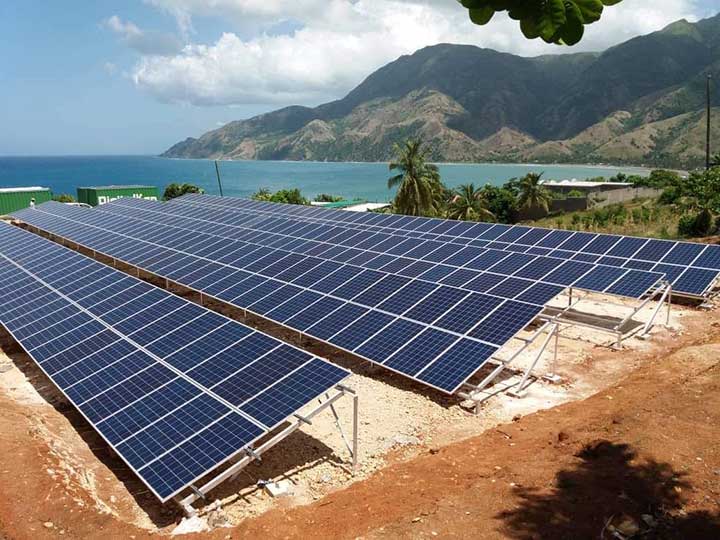Deploying Minigrids for Sustainable Economic Growth in Haiti
The USAID-NREL Partnership and the World Bank collaborated with the Government of Haiti to develop a request for proposals (RFP) for the development of minigrids in Haiti.

Additionally, a geospatial analysis tool, the Renewable Energy (RE) Data Explorer, was developed by the USAID-NREL Partnership for the Dominican Republic and Haiti to analyze and visualize renewable energy potential on the island.
Focusing on Haiti's Energy System Stability
Throughout its history, Haiti has experienced repeated natural disasters including hurricanes, tropical storms, flooding, and earthquakes. The country's infrastructure and small national grid are vulnerable to blackouts, energy price volatility, and other destabilizing forces.
As such, rebuilding Haiti's energy systems with a focus on stability and affordability is critical. Without access to reliable power, Haiti’s efforts to spur economic growth, improve access to education, and enhance quality of life are hindered.
Minigrids can improve energy access in rural areas by enabling power supply for communities that would otherwise be without reliable electricity. While the basic engineering principles of minigrids are well established, construction and operation methods can vary widely and be location dependent. This may result in variations in power quality and reliability.
Support for a Robust Minigrid Request for Proposals
In March 2019, a technically robust minigrid RFP was released as part of a broader plan to support the development of 54 minigrids in Haiti, incorporating significant shares of renewable energy. The RFP was developed by the Autorité Nationale de Régulation du Secteur de l'Énergie (ANARSE), the Government of Haiti’s electricity regulator, and the Energy Cell within the Ministry of Public Works, Transportation and Communication (MTPTC), with advisory support from the World Bank, USAID, and NREL.
The RFP lays out key regulatory elements to enable successful minigrid deployment, including licensing, service levels, power quality, technical standards, tariffs, and preparation for grid arrival.
Minigrid Capacity Building Trainings
Prequalified Minigrid Request for Proposals Bidder Training
Renewable Energy Data Explorer Tool for Dominican Republic-Haiti
The USAID-NREL Partnership also developed a Renewable Energy Data Explorer for the Dominican Republic and Haiti. This tool performs visualization and analysis of renewable energy potential that can be customized for different scenarios. RE Data Explorer can support prospecting, integrated planning, policymaking, and broader energy sector planning to accelerate renewable energy deployment.
To try out the tool, access it on the RE Data Explorer website.
To support the minigrid RFP process, NREL provided a training to 30 renewable energy developers identified by the Government of Haiti as prequalified bidders. It focused on the following key topics identified as priority areas by the developers in advance of the training:
- Approaches for demand assessment for minigrids
- System design
- Tariff considerations
- Financing
- System maintenance and operation.
The developer training was broadly aligned with NREL’s Quality Assurance Framework (QAF) for minigrids, which provides a flexible approach and guidelines for developing safe, high-quality, and financially viable minigrid power systems for remote customers. Portions of the discussion sessions focused on ways to implement key minigrid approaches specific to Haiti. For more information about the QAF, see the Clean Energy Solutions Center website.
Watch the developer trainings:
Demand Assessment and System Design
Financial and Tariff Considerations, Financing, and System Maintenance and Operations
Government of Haiti Stakeholders Minigrid Training
Building on the training for project developers and support for the RFP, NREL provided a three-day virtual training to Government of Haiti stakeholders on developing a broader policy environment for minigrids and use of the RE Data Explorer to support renewable energy deployment more broadly.
The training was developed in close collaboration with Energy Cell, a key Government of Haiti partner under this effort. The training and interactive discussions covered the following topics:
- Potential opportunities to unpack the RFP into individual policies
- Monitoring and evaluation for minigrids
- Enabling productive use of minigrids.
Watch the Government of Haiti stakeholder trainings:
Demand Assessment and System Design
Financing and Tariff Considerations, Financing, and Operations and Maintenance
Share
